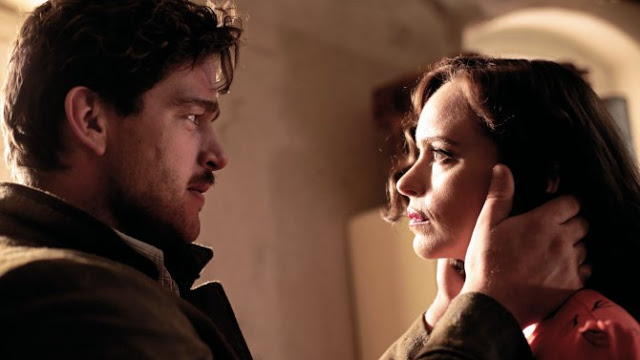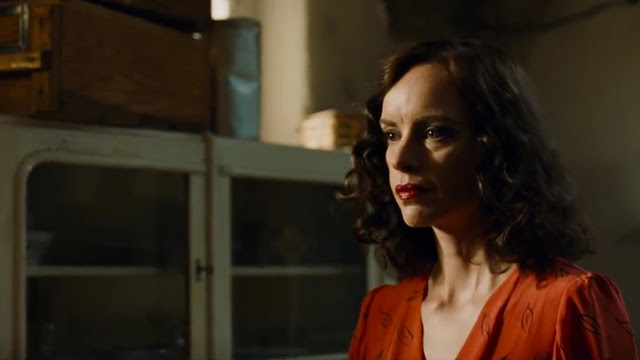Suspension of disbelief is typically a viewing requirement at the multiplex, not the art house. Superhero movies and science-fiction flicks are expected to stretch the boundaries of reality in ways anathema to dialogue-driven dramas and period pieces. Phoenix, Christian Petzold’s electric, implausible anti-love story, is the type of muted, modestly scaled film that you wouldn’t expect to ask audiences to take a giant leap of faith. But it does precisely that, hinging on a conceit that, if rejected, threatens to topple the entire enterprise. If you refuse to accept the cornerstone of Phoenix‘s vertiginous plot, you may struggle to find rapture in its supple technique and vast emotions. But if you surrender yourself, you are likely to become intoxicated by its smoky beauty and limitless longing.
I strongly urge you to try your best, though my urgings are insignificant compared to those of Nina Hoss. A German-born actress best known to American audiences as one of Philip Seymour Hoffman’s weary spies in A Most Wanted Man (and also the anchor of Petzold’s sobering Cold War film, Barbara), Hoss delivers a transcendent performance as Nelly, a concentration camp survivor who was shot in the face during the war (in a wise decision, the details of the shooting are never explained), and who begins the film wrapped in bandages. She’s returning to Germany with her friend, Lene (Nina Kunzendorf, perfectly crisp), in order to undergo facial reconstructive surgery. When the doctor asks Nelly whom she wants to look like, she demands that he return her to her original self. “You won’t look exactly the same,” the surgeon warns her, and the subtitles for that line might as well be accented in bold.
Following the surgery, Nelly resolves to locate her husband, Johnny (Ronald Zehrfeld, also from Barbara), despite Lene’s forceful claims that Johnny is a reprobate who sacrificed Nelly to the Nazis. And so, she prowls the streets of nighttime Berlin, drawn magnetically to a burlesque called Phoenix, where she finds Johnny working as a busboy. Their reunion does not go quite as she imagined; when she calls out to Johnny, he glances at her, then performs what might be described as a double-take of non-recognition. Johnny, you see, is so convinced that his wife died in the war that, even though this bruised woman looks just like her, he dismisses her as a doppelganger. Instead, he decides to have Nelly pretend to be his wife in order to collect her inheritance, which they will then split. Thus begins an extended passage in which Johnny coaches Nelly on how to behave like his wife, from her handwriting to her wardrobe and even to her walk. The entire time, Nelly—in a state of perpetual bewilderment—attempts to abide by his gruff commands while also trying to discover just what, if anything, remains of their marriage.
You may be dizzy, which makes sense, given that Phoenix‘s plot operates as a sort of warped Vertigo. Once again, a powerful man forces a beautiful woman to dress up and impersonate his former lover; the difference is that this time, the woman actually is his lover, he just doesn’t know it. And that is where the element of suspension of disbelief comes into play. To believe Phoenix, you must not only accept that Johnny is incapable of recognizing his wife despite all evidence that she has, in fact, returned. (The doctor’s convenient explanation regarding the surgery’s less-than-perfect efficacy is particularly useful here.) You must also accept that Nelly, rather than revealing herself to Johnny, is willing to silently comply with his charade.
Why does she? It is hard to say, but it is also hard to mind. Much of Phoenix feels like a fever dream, with Nelly lost in a fog of emotion and confusion. The more comfortable she becomes at imitating Johnny’s dead wife (that is to say, herself), the more devastated she seems that Johnny is oblivious to her true identity. Every scene takes on a stabbing feeling of pain and desperation, a sensation amplified by Hoss’s magnificent performance. When she dons a stunning red dress that Nelly used to wear, she stops the camera dead—Hans Fromm’s cinematography is consistently striking but never showy—but even when she’s silent, her face conveys the whirl of emotions churning underneath. Hoss is our window into Nelly’s soul, and her inscrutability is both fascinating and heartbreaking.
Yes, but do you buy it? Does it matter? Phoenix is such a gorgeous and sensual experience that the credibility of its plot seems meaningless. In a strange way, reflecting on it reminds me of A.O. Scott’s review of House of Sand and Fog, which he labeled “the nearly flawless execution of a deeply flawed premise”. I feel much the same about Phoenix, though I would call its premise “dubious” and its execution “breathtaking”. I mean the latter term in the most literal sense. The final scene of this movie, in which Nelly delivers a stunning rendition of a classic jazz tune to a dumbfounded crowd, is a seminal moment in cinema. She leaves the members of her audience speechless, frozen in awe. They are not the only ones.
Jeremy Beck is the editor-in-chief of MovieManifesto. He watches more movies and television than he probably should.


